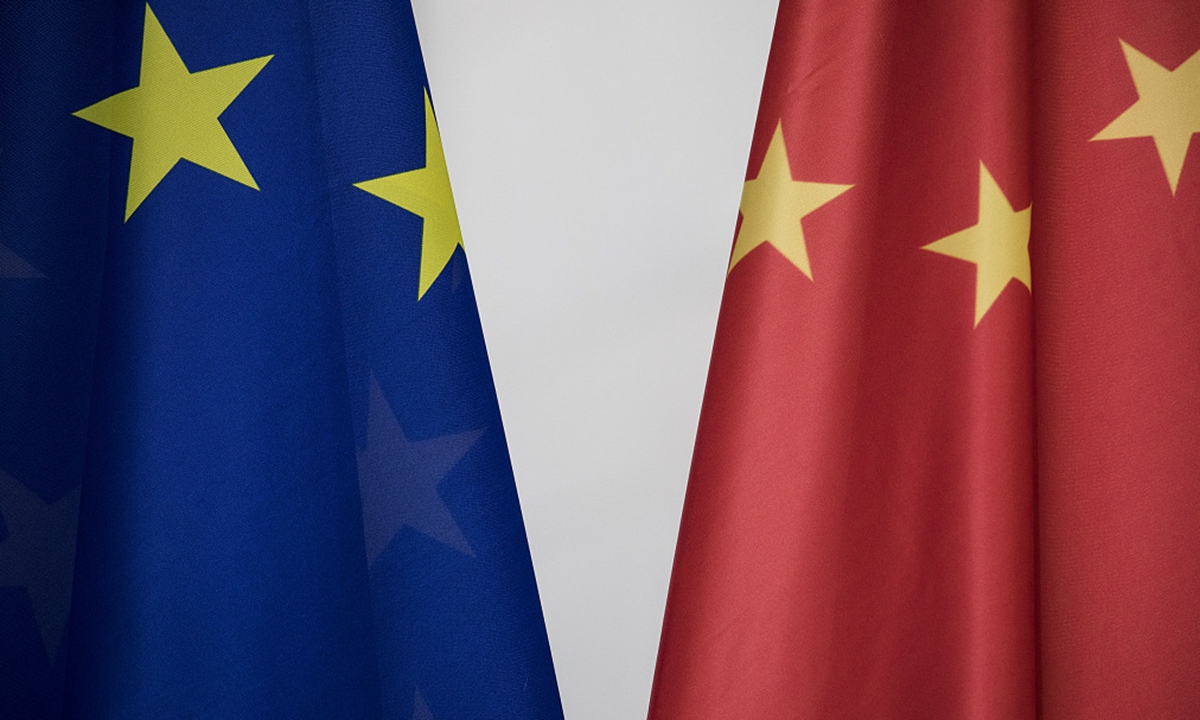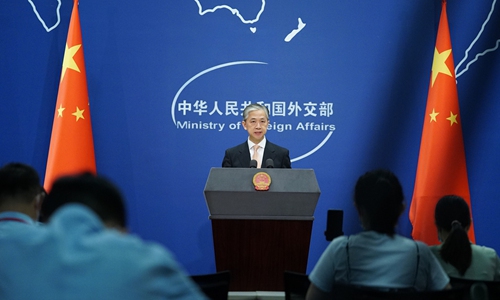China-EU investment pact talks make significant progress: FM
'Very positive' signal of breakthrough this week: experts

China EU Photo:VCG
Significant progress has been made on a long-awaited investment treaty between China and the EU, China's Foreign Ministry revealed on Tuesday, sending a bullish signal for a major breakthrough in the economic and trade relationship between two of the world's largest economies.
Describing negotiations over the China-EU Bilateral Investment Treaty (BIT), also known as the Comprehensive Agreement on Investment (CAI), as the most important agenda for the current China-EU relationship, Foreign Ministry spokesperson Wang Wenbin told a regular press conference Tuesday that under the two sides' joint efforts, the CAI talks have made significant progress and the prospects (of signing the treaty) are foreseeable.
It is hoped the deal will be struck soon to provide a staunch institutional framework for China-EU economic and trade cooperation, creating tangible benefits for businesses and the people from both sides, according to Wang.
Since the BIT talks kicked off in 2013, 35 rounds of negotiations have been held, stoking expectations for the two sides to conclude the talks by year's end, a deadline which has previously been agreed on.
"Wang's remarks send out a very positive signal that a breakthrough is expected as soon as this week," Cui Hongjian, director of the Department of European Studies at the China Institute of International Studies, told the Global Times on Tuesday.
Echoing Cui, Dong Dengxin, director of the Finance and Securities Institute at the Wuhan University of Science and Technology, said there is a big chance of the two sides clinching the deal in the very near future.
Dong based his optimism on China's unwavering vow to open up its economy, a beacon of hope for the EU economy that has taken a battering from a double whammy of the pandemic and US-advocated protectionism.
China and the EU could reach the landmark investment deal this week, "with the 27 countries in the trade bloc unanimously approving the agreement despite earlier reservations," the South China Morning Post reported late Monday, citing unidentified sources.
When reached by the Global Times on Tuesday, the EU Chamber of Commerce in China said no further information was available.
The trade accord will purportedly commit China to lifting foreign shareholding limits in the automobile and telecom sectors. It will also increase market access for EU firms in financial services such as banking, according to POLITICO, citing Jörg Wuttke, president of the EU Chamber of Commerce in China.
The reported concessions point to EU firms' interest in the Chinese market, where a push for greater opening means a bigger role for foreign businesses, experts said.
In the financial arena, China has ramped up the removal of foreign ownership restrictions this year, opening its securities, fund management and futures sectors to foreign investors.
With the purported concessions fundamentally in line with China's opening-up drive, it is in the interests of China to ease limits on these areas for European investors, observers noted, adding that easier access to China's telecom sector would also help break a US-initiated tech blockade.
In a sign of crackdown, the US announced recently it was adding dozens of Chinese firms to its entity list of export controls, including major Chinese chipmaker SMIC and Chinese drone maker SZ DJI Technology Co.
China, for its part, is reported to be eyeing broader investment in the EU's energy and high-tech sectors.
Concessions to be made on the part of the EU might pit Brussels against the US, as some EU critics have voiced concerns over the possibility of complicating the continent's efforts to align with the incoming Joe Biden administration, media reports said.
The Biden administration might be a disturbance for the deal, Cui said, noting however that the US is unlikely to become a key influencer in deciding the fate of the CAI.
China and the EU account for roughly one-third of global GDP, meaning that the expected deal signing would stabilize one-third of the global economy, Cui went on to say, noting that a closer tie-up with China that has proven to effectively revive its economy despite the virus onslaught would help put the EU economy on track for a much-needed rebound.
The deal that would act as a stimulant for regional economic recovery is also expected to become a template for more countries to sign similar agreements with China, thereby uplifting the Asian economy at large, Cui remarked.
A breakthrough around the corner would also inject optimism into a global economy hijacked by anti-globalization, observers said, anticipating the deal to become a trendsetter in the global economy that is anxiously awaiting a turnaround toward multilateralism and fair competition to be underpinned by globalization.
After a multi-year push for populist protectionism, the US has seen its unruly moves dealing a blow to its own economy and the global economy, Dong told the Global Times on Tuesday, betting that the China-EU tie-up would "walk notably the EU economy out of the stalemate."



